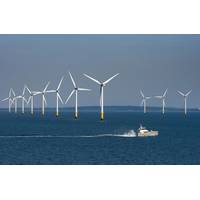Total's New CEO a Good Fit
Pouyanne took over as Total CEO a year ago.
Total's boss is known as a fixer; a straight-talking cost cutter who has emerged as the right person to steer the French oil and gas company through one of the industry's worst downturns in decades.
The 52-year-old Patrick Pouyanne could not be more different from his predecessor, the flamboyant Christophe de Margerie, who died last October in a plane crash outside Moscow.
While de Margerie excelled at making big deals in upstream exploration when money flowed during the oil price boom between 2011 and 2014, Pouyanne was busy at the other end, overhauling Total's downstream loss-making refining and petrochemical businesses.
"De Margerie came from a heavily upstream background and was hugely regarded within the organisation. To follow with a similar CEO would have been difficult," said Charles Whall, energy portfolio manager at Investec Asset Management, who invests in Total shares.
"Pouyanne brings (cost) cutting experience, he is very measured and precise in his delivery and dealings internally and particularly externally, I think this is appropriate in this time frame," Whall said.
Pouyanne's first year in office has been challenging with oil prices more than halving to around $50 a barrel due to oversupply and slow demand, forcing oil companies to cut spending, sell assets and cancel costly projects.
He has brought to Total a management style focused on results with little tolerance for the superfluous. When he saw presentations prepared for investors in September, he ordered them stripped of all but essential detail.
"Investors want to hear about cash flow and dividend, cash flow and dividend, cash flow and dividend, nothing else," he is said to have told managers, according to a source close to the company.
From the firm's executive committee in Paris to units as far flung as Papua New Guinea, he is laying out his approach.
"Step by step, probably the management style will change, because I'm not Christophe as you know, I have some qualities, I have some defaults also, like him," Pouyanne told investors in October last year a few days after taking over.
Investors are adapting to the change in personal style.
At the end of an annual investor day in September last year, de Margerie, known as "Big Moustache", personally toasted every investor who attended a reception at London's landmark Gherkin skyscraper with his favourite Lagavulin single malt whisky and he stayed until the last guest left.
This year, Pouyanne scrapped the annual reception and went to see France playing in the Rugby World Cup instead.
He has made investors happy in other ways. He has steadied the ship in a market roiled by falling oil prices. Total's share price has risen about 3.5 percent so far this year, outperforming the European oil and gas index.
In last month's London presentations, Total vowed to protect its dividend and said it would further reduce capital expenditure and increase cost cutting.
Since the downturn only Italy's Eni has cut its dividend among oil majors. Total kept its dividend unchanged for the second quarter at 0.61 euros per share.
Credit Suisse, which has a "buy" rating on Total, said in a Sept. 25 note that it felt more comfortable that Total could deliver a superior free cash flow yield compared with peers.
However, investment bank Jefferies, which has a "hold" rating, said in a Sept. 28 note that although it did not expect Total's stock to underperform, it saw little need to buy because the stock was not especially cheap, trading at premium to peers.
'REALISTIC VIEW'
Pouyanne joined Total some 18 years ago after stints as a ministerial adviser. Postings saw him in Angola and Qatar before he became head of the group's chemicals and refining division, where he overhauled plants and cut jobs to lift profit margins.
He is expected to do similar in the rest of the group, especially Total's upstream business where the exploration budget has been cut and its focus shifted to resources in less risky regions. He has abandoned the group's 'high-risk, high-reward' drilling strategy following disappointing exploration results.
"These guys had to go through and completely rethink how you run those downstream businesses and tear up rule books and rebuild a culture that is very much cost focused," Investec's Whall said, referring to Pouyanne and rival Royal Dutch Shell (RYDAF)'s CEO Ben van Beurden.
"They have both been extremely successful and it brings Pouyanne particular credibility in the environment we find today."
A source close to the company said Pouyanne's main goal was to reduce the group's cash breakeven. "Then it is delivering on current projects so to generate cash and finally to cut costs," the source told Reuters.
All the analysts Reuters spoke to approved of Pouyanne's strategy, and dismissed suggestions the cost cuts could jeopardise the company when the oil price rises.
"They took a realistic and conservative view of where oil prices will trade, and are managing their businesses appropriately," George Maris, fund manager at Janus Capital Group, which has a stake in Total, based on latest available public filings, said.
"They are demonstrating good growth as well as discipline, and we are encouraged."
By Bate Felix











